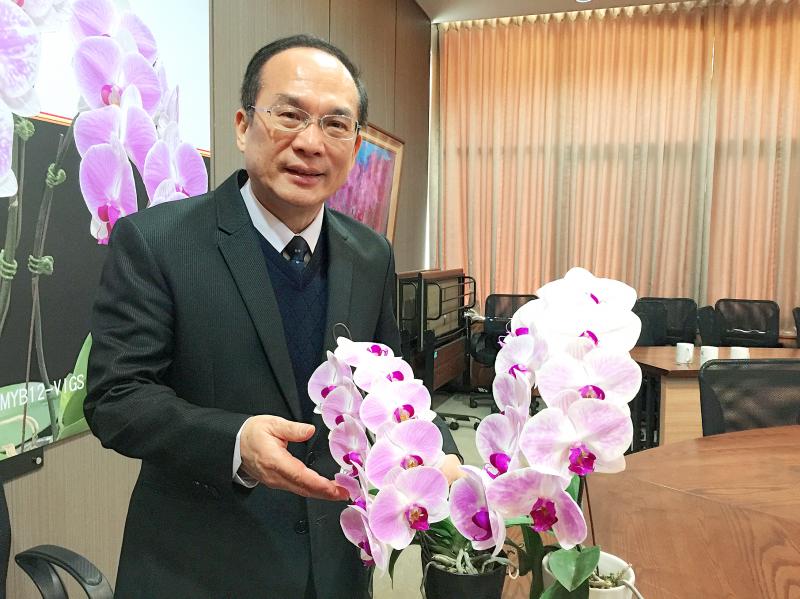National Chung Hsing University (NCHU) researchers have discovered certain genes in orchids that can be used to manipulate flower hue, prolong the flowering period and prevent wilting, which could reduce the time needed to produce new orchid varieties from seven years to two months.
There are more than 28,000 varieties of orchids, making them one of the largest and most diverse families of flowering plants, NCHU vice president and Graduate Institute of Biotechnology professor Yang Chang-hsien (楊長賢) said on Wednesday.
The popularity of orchids lies in their flowers, which are defined by a symmetrical perianth — the non-reproductive elements of the flower — separated by a distinct petal called the lip or labellum that attracts insects, he said.

Photo: Su Meng-chuan, Taipei Times
Five years ago, a research team led by Yang developed the “perianth password” theory, which discovered the L and SP complexes behind orchid petal formation.
The SP complex determines sepal and petal formation, while the L complex determines the identity of the lip.
In a paper published on Feb. 10 in Nature Communications, the team said that the SP complex not only moderates sepal and petal formation, but also pigmentation, deterioration, shedding and other life cycle processes.
Three of the genes involved in the creation of the SP complex can change the color of the flower, Yang said.
These proteins can be suppressed through gene silencing to reduce anthocyanin — or pigment — accumulation, in effect bleaching the flower, he said.
He provided two samples, one of a purple-red moth orchid that became significantly whiter after intervention, and the other of an orange moth orchid that became yellow.
Also using gene silencing, other proteins in the SP complex can be suppressed to make the flowers age or the stem harden prematurely, ensuring that the flowers do not fall off even when withered, Yang said.
It takes seven to eight years to cultivate new types of orchids through relatively unpredictable cross-breeding, but with this method, a new color could be produced in as little as two months, he said.
The flowering period could also be stretched longer than the standard 80 to 100 days, he added.
Yang said the discovery refutes the assumption that the genes governing flower formation retreat after the floral organs are formed, showing that these mechanisms remain important in other stages of flower development.
The finding is a breakthrough in the field of international flower research, he said.
It also has practical implications, as the technique can increase the output diversity and value of the domestic orchid market, he added.
Other article authors include NCHU postdoctoral researchers Hsu Hsing-fun, Chen Wei-han, Hsu Wei-han and Mao Wan-ting, as well as master’s degree student Shen Yi-hsuan.

Japanese footwear brand Onitsuka Tiger today issued a public apology and said it has suspended an employee amid allegations that the staff member discriminated against a Vietnamese customer at its Taipei 101 store. Posting on the social media platform Threads yesterday, a user said that an employee at the store said that “those shoes are very expensive” when her friend, who is a migrant worker from Vietnam, asked for assistance. The employee then ignored her until she asked again, to which she replied: "We don't have a size 37." The post had amassed nearly 26,000 likes and 916 comments as of this

US President Donald Trump said "it’s up to" Chinese President Xi Jinping (習近平) what China does on Taiwan, but that he would be "very unhappy" with a change in the "status quo," the New York Times said in an interview published yesterday. Xi "considers it to be a part of China, and that’s up to him what he’s going to be doing," Trump told the newspaper on Wednesday. "But I’ve expressed to him that I would be very unhappy if he did that, and I don’t think he’ll do that," he added. "I hope he doesn’t do that." Trump made the comments in

Tourism in Kenting fell to a historic low for the second consecutive year last year, impacting hotels and other local businesses that rely on a steady stream of domestic tourists, the latest data showed. A total of 2.139 million tourists visited Kenting last year, down slightly from 2.14 million in 2024, the data showed. The number of tourists who visited the national park on the Hengchun Peninsula peaked in 2015 at 8.37 million people. That number has been below 2.2 million for two years, although there was a spike in October last year due to multiple long weekends. The occupancy rate for hotels

A cold surge advisory was today issued for 18 cities and counties across Taiwan, with temperatures of below 10°C forecast during the day and into tonight, the Central Weather Administration (CWA) said. New Taipei City, Taipei, Taoyuan and Hsinchu, Miaoli and Yilan counties are expected to experience sustained temperatures of 10°C or lower, the CWA said. Temperatures are likely to temporarily drop below 10°C in most other areas, except Taitung, Pingtung, Penghu and Lienchiang (Matsu) counties, CWA data showed. The cold weather is being caused by a strong continental cold air mass, combined with radiative cooling, a process in which heat escapes from